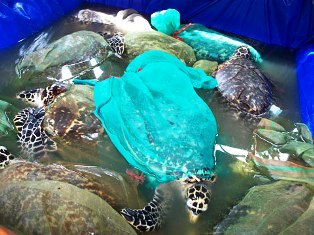It's the only dry forest in Vietnam.
Nui Chua National Park, in the central province of Ninh Thuan,
is considered "a desert" thanks to its dry conditions and low rainfall.
Located around 40km from Phan Rang City , the 30,000ha site in Ninh Hai
district was first designated a national park in 2003.
It
is bounded by the East Sea to the south and east, by Highway 1 to the
west and to the north by part of Cam Ranh Bay in neighbouring Khanh Hoa province.
It is of a special type, boasting a dry ecology in Southeast Asia with a miracle of different floral and fauna species.

A few years ago, a Germany scientist could not believe the dry level measured by his machine in the forest. After measuring again and again, he came to the conclusion that the climate in Nui Chua forest is as dry as that in Africa.
Currently, Phan Rang city remains hot and dry though the rainy season is drawing near.
Long dunes of sand and stones caught our eyes when we first set foot on
the soil of Nui Chua National Park. Thousands of stones of different
sizes are piled up, creating a sense of fierceness and formidableness.
On that dry stony and semi-wasteland ground, rooted stunted thorny trees
and bushes form a forest.
Entering the park, tourists in Vietnam Tourism will
encounter green trees growing amid stones and sand in an intensely hot
and dry climate. To cope with the intense heat and dryness there, all
the local fauna and floral species have their own way of adapting. In
the dry season, most of the trees look like skeletons with rough,
stunted and snaking trunks and tiny branches and leaves. Surprisingly,
they bud immediately and start a new life after the first rain comes.
Scientists recognized that the natural resources of Nui Chu National Park in Ninh Thuan Province are
not only abundant and diverse in biological elements but also have the
endemic, rare, precious and valuable characteristics, very useful to
scientific research and protection of the gene resource and contribute
economic benefits, especially the eco-tourism.
It
has a rich flora with 1,265 varieties of plants, of which 390 varieties
are medicinal plants, over 100 varieties belong to bonsai trees and
many varieties are edible. It also has a diverse fauna with 306 species
of vertebrate animals, including many rare and precious animals, such as
the black-shanked douc, white-collared bear, puma and japuar.
At
Nui Chua National Park, there is a forest of apricot trees. Due to the
arid soil, the apricot trees look like bonsai trees, but in spring they
are in yellow blossom, producing a beautiful landscape. The typical
apricot variety of this area is Hong mai which has red flowers, some of
which have up to 13 petals. Nui Chua National Park is also home to many
rare orchids, too.
Visitors in Vietnam Tourism are
additionally afforded the chance to explore the park via 20km of
asphalted roads embracing Mount Nui Chua, the Ngoan Muc Pass and Treo
Lake on Mount Da Vach at an altitude of 250m.
Lo
O Stream in particular, is a historical beauty spot surrounded by
cliffs and clear waterfalls, its flat granite stones idyllic for
picnics.

The magnificent mountain ranges overlook the appealing and pristine bays of Vinh Hy and Ninh Chu Beach .
Visitors in Vietnam travel interested
in visiting the only savanna in Vietnam can drive from Ninh Chu Beach
in Khanh Hai Commune along provincial Highway 702 to Vinh Hy Bay.
After a few hours of sightseeing, tourists are free to choose among beaches spread over nearly 40km for swimming and cruises, as well as coral reefs with diverse marine life, visible via glass bottomed tourist boats.
The farthest border of Nui Chua National Park is Thit Beach where sea turtles come and lay their eggs.

Travelers in Vietnam travel can
also walk down to Cau Gay Village , home to the Raglai ethnic minority
group, and visit local craft shops to catch a glimpse into the lives of
the artisans.
Military base CK 19,
used by the liberation army in the, anti-American war, lies near Treo
Lake on Mount Da Vach and includes traces of guerrillas trench shelters
and the smokeless stoves.
The local coast was formerly used to transit weapon and other military equipment from north Vietnam to battlefields in the south
For tourists in Vietnam travel, It's really the interesting adventure to discover nature and experience culture.
No comments:
Post a Comment